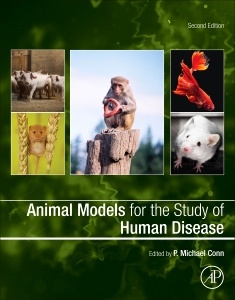Animal Models for the Study of Human Disease (2nd Ed.)
Coordonnateur : Conn P. Michael

Animal Models for the Study of Human Disease, Second Edition, provides needed information on model sharing, animal alternatives, animal ethics and access to databanks of models, bringing together common descriptions of models for busy researchers across biomedical and biological sciences.
Offering easily searchable advantages and disadvantages for each animal model and organized by disease topics, this resource aids researchers in finding the best animal model for research in human disease.
1. Ethics and animal research: Foundations, basic principles, applications for animal models of human disease 2. Psychological enrichment of animals in research 3. Large Animal Models 4. Animal models of cataracts 5. Animal models for retinitis pigmentosa 6. Animal Models for Atherosclerosis and myocardial infarction 7. Animal Models for cardiovascular research 8. Animal models of cardiac disease 9. Animal models of metabolic syndrome 10. Animal Models of Diabetes 11. Animal models of obesity 12. Models for the manipulation of energy expenditure 13. Animal models for liver diseases 14. Animal Models of Skin Regeneration 15. Animal models of skin disorders 16. Models of Chronic Kidney Disease 17. Animal Models of Urinary Stone Disease 18. Animals models for for healing studies after partial nephrectomy 19. Animal models of IBD 20. Animal models of stroke 21. Zebrafish models of olfactory and neuromuscular dysfunction of degeneration 22. Animal models of drug abuse 23. Animal models of schizophrenia 24. Animal models for the exploration of Klinefelter's syndrome 25. The Use of Zebrafish in Medical Genomics 26. Transgenic pigs as models for translational biomedical research 27. Genetically modified animal models 28. Mouse model of human disease by forward and reverse genetics 29. Animal models of neonatal seizures 30. Animal Models for the Study of Infection-Associated Preterm Birth 31. Animal models for the study of neonatal disease 32. Animal models of fetal programming 33. Animal models of human viral diseases 34. CRISPR Models of Cancer 35. Animal models of breast cancer 36. Animal models of systemic sclerosis: past, present, and perspective 37. Animal models of multiple sclerosis 38. Animal Models of Mood Disorders 39. Pigs in Behaviour Models 40. Models of Alzheimer's disease 41. MPTP-induced animal models for Parkinson's disease 42. Animal Models of Neurodegenerative Disease 43. Animal models of mania 44. Animal Models of Stress Coping and Resilience
Biomedical and Basic Researchers
- Organized by disease orientation for ease of searchability
- Provides information on locating resources, animal alternatives, and animal ethics
- Covers a broad range of animal models used in research for human disease
- Contributed by leading experts across the globe
- Expanded coverage of diabetes and neurological diseases
Date de parution : 06-2017
Ouvrage de 1198 p.
21.4x27.6 cm
Thème d’Animal Models for the Study of Human Disease :
Mots-clés :
3D organotypic skin culture; acute kidney injury; addiction; aging; aging and gender; Alzheimer's disease; amyotrophic lateral sclerosis; anhedonia; animal models; animal welfare; antioxidant; antipsychotics; AP-1; apoptosis; atherosclerosis; atopic dermatitis; autonomic innervation; autophagy; aversion; B6Ei.Lt-Y mice; basic research; behavior; behavioral management; behavioral neuroscience; behavioral test; beige adipocytes; beta cell; biomedical animal research ethics; bipolar disorder; bowel; Brattleboro rat; breast cancer; brown adipocytes; C; elegans; Caenorhabditis elegans; calpain; cancer animal models; cancer modeling; candidate genes; canine; carcinogens; cardiac denervation; caspase; cataract; cell death; cerebral ischemia; cerebral palsy; childhood seizure; chronic kidney disease; chronic lung disease; cognition; collecting system; common marmoset; complex trait; conditioned place preference; conditioned taste aversion; confounds (intervening variables); coronary; coronary artery occlusion; coronary artery stenosis; CPP; CRISPR-Cas9 system; CTA; Danio rerio; degeneration; demyelination; depression; diabetes; diabetes mellitus; diet; disease mechanism; DOHaD; dopamine; Drosophila; Drosophila melanogaster; dysfunction; dyslipidemia; EAE; electroretinogram (ERG); emotion regulation; endoplasmic reticulum stress; energy expenditure; enrichment; environment; epigenetics; epilepsy; epileptogenesis; escapee genes; ethics; experimental model; experimental unit; extinction; febrile seizure; feline; fetus; focal ischemia; frontotemporal dementia; functional genomics; gene editing; gene mutations
